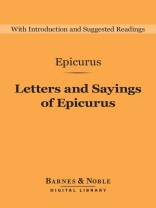This edition includes a modern introduction and a list of suggested further reading.
Throughout the ages Epicurus has been both idealized and anathematized. As an atheist materialist philosopher he was an offense to religious thinkers. Many of his influential admirers, like Thomas Hobbes and Thomas Jefferson, had to keep their Epicurean leanings a secret. On the other hand, the philosopher-physicist Isaac Newton was candid enough to assert openly that he was reviving the tenets of the Epicurean philosophy when he embarked on his world-transforming project. Epicurus’ significance transcends even his astounding historical influence because the subjects he reflected on – the purpose of life, the nature of reality, natural phenomena, and death – are of enduring significance.
关于作者
Epicurus was born, probably in Athens, in 341 BCE, when the city was a pale reflection of its resplendent past. Epicurus’ parents, Neocles and Chaerestrata, were impecunious Athenians who joined a mission of economically driven colonists. Epicurus grew up on the island of Samos and studied with Platonist Pamphilus. In 311, Epicurus moved to Mytilene, on the island of Lesbos, where he opened a school of philosophic teaching. In 306, he moved to Athens with a few of his pupils. Epicurus died in 271.












